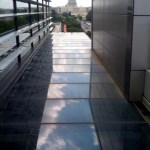Science
According to Boing Boing, two homeless men got in a brawl over quantum physics, which ended with a skateboard to the face:
At the time, Fava was chatting with an acquaintance, who is also homeless, about "quantum physics and the splitting of atoms," according to prosecutors. Keller joined in the conversation and, for reasons unknown, got upset, authorities said. He picked up his skateboard and hit Fava in the face with it, splitting his lip, prosecutors said.
Of course he did. The moral: don't (en)tangle with a homeless physicist!
When I was a postdoc, I made it a habit to try to spend at least one week a year visiting Isaac Chuang's lab at MIT. There were many reason for this, including that Ike has been a collaborator of mine, and Ken Brown, another collaborator was working as a postdoc in the lab. But another reason was...it's damn nice for a theorist to sit in a real experimental lab. Oh sure, you need to keep the theorists away from all the cords and knobs for fear that they might actually touch something. And don't ever let a theorist chose the music being played in the lab or you'll end up hearing some real…
Shortly before I left for Florida, my post on the taxonomy of Strumigenys spurred a comment from an anonymous colleague:
I wouldnât be so bold as to publish so many evaluations of ideas without the backing of formal peer review. I wouldnât be as concerned about the validity of my criticisms, but rather the perceived validity. Perhaps Iâm hypersensitive to alienating other scientists. I just wouldnât want to be responsible for airing other peopleâs dirty laundry.
Iâm not saying that youâre unfair. But I think most people whose work is being reviewed on your site feel that it wonât stand up to…
"Assessing the Impact of Science Funding," by Julia Lane, from the June 5 Science, ends with a gratifying shout-out to visualization as an essential part of the scientific process:
A related intellectual investment is to advance understanding of how to convey complex answers about the impact of science investments to the public. Emerging visualization techniques seem to be more effective than tables and digital slide presentations at communicating the ways in which science investments bear fruit across a range of topics and disciplines. However, although visual representations are intuitively…
Via a comment by Christina Pikas, there's a post at the Scholarly Kitchen about a new study quantifying the use of the arxiv:
Employing a summer intern, Ingoldsby conducted an arXiv search of nearly 5,000 journal articles published by the American Institute of Physics and the American Physical Society. Their methodology was painstakingly robust, looking for title variations and having all unsuccessful searches repeated by a trained physicist.
The percentage of articles found for each journal in their studied varied greatly. While fields such as elementary particle physics and astrophysics…
There's an interview with me, plus bonus comments from Emmy, over at Paw Talk:
Words of advice for fellow pet owners?
If you're looking to get a dog, I'd recommend visiting your local animal shelter, as you can find lots of great dogs there. And take walks with your dog-- every now and then, I see people who just leave their dogs penned up in the yard, and that's just sad. Get out, see the neighborhood, and get a bit of exercise. Yeah, it's a drag sometimes, especially when it rains, but it's better for both of you.
Emmy: Treats. Lots and lots of treats. Also, don't trust the squirrels. They'…
The "slow movement" is a vast beast: there's Slow Food, Slow Travel, Slow Money, and even, I kid you not, Slow Reading. These movements all begin with the premise that modern culture emphasizes ever increasing speed and convenience (cue the Eagle's: "Listen, baby. You can hear the engine ring. We've been up and down this highway; haven't seen a goddam thing.") The prescribed medicine is a moderance in life. More smelling of the roses (but watch out for Ringo), more taking the long road, and most definitely more chewing your food slowly. While the movement suffers from large doses of…
I'm here in DC at the Newseum for the State of Innovation Summit, a collaboration between SEED and the Council on Competitiveness. The crowd is pretty awesome - right now Adam Bly, SEED's CEO, is sitting a few rows from me with E.O. Wilson. Earlier, Wayne Clough, Secretary of the Smithsonian Institution, talked about a conversation he'd had recently with Steven Chu about using the Smithsonian's resources to enhance public understanding of climate change. As he spoke, the intense sunshine of a summer day in DC played across the Smithsonian castle turrets directly behind him (the seventh floor…
Think of a scientist - not anyone in particular, just a random individual working in the field. Got one? Did you picture a man or a woman? If it's the former, you're probably not alone. There have been a few times when I've only ever known a scientist through their surname on a citation and automatically assumed that they were a man, only to learn, to my chagrin, that they're actually a woman. It's always a galling reminder of how pervasive the stereotype of science as a male endeavour can be, even at an unconscious level.
Now, Brian Nosek from the University of Virgina, together with…
I am horribly envious. I am speaking of the Village Dog Project, some current research going on that looks very cool.
Understanding the evolution and domestication in dogs requires genetic analysis of a global and diverse panel of non-breed-affiliated village dogs. With a network of worldwide and Cornell-affiliated collaborators, we plan to gather dog samples from remote villages, establish a genetic archive containing DNA and phenotypic information from these dogs, carry out genetic analyses on these samples, and develop computational methods for analyzing this dataset. In particular, we are…
Kate's Tolkien re-read has reached Rohan, and her latest re-read post includes a reference to a comment I made about Legolas's improbable visual acuity:
Re: Legolas seeing the Riders: I have since been advised by the resident physicist that the size of a pupil is a limiting factor on the resolution possible--if I understood properly, basically it boils down to how much light can come in--and under the laws of physics as we know them, it is not actually physically possible for Legolas to have resolved that level of detail at 5 leagues, regardless of how good his brain is at decoding images or…
An ant, climbing from the pit of a predatory ant lion.
The predator, buried in sand at the base of the pit, hurls a volley of debris towards its target.
Caught in the falling sand, the ant slides back into the pit.
The ant tries to escape, and again the unseen predator hurls a load of sand into her path.
No matter which way the ant turns, the ant lion adjusts its aim, sending up clouds of sand and preventing the ant from gaining traction on the steep walls of the pit.
In the end, the ant lion wins.
A tight crop of the previous image shows the jaws of the ant lion reaching up…
A wag of my finger at the Corporate Masters, for their new article about traffic jams, with the subhead "For particle physicists who study phase transitions, a traffic jam is simply a solid made up of idling cars." In the body of the article, we find:
While the concept of critical density has been repeatedly demonstrated using computer simulations--drivers are surprisingly easy to model as a system of interacting particles--it wasn't until last year that this theory of traffic was experimentally confirmed. A team of physicists at Nagoya University wanted to see how many cars could maintain a…
There once was a dog from Niskayuna...
The previous post announced a photo caption contest for a chance to win an advance proof copy of my book, How to Teach Physics to Your Dog, six(-ish) months before it's available for purchase. I thought I should include something for the less visually inclined, though, and I do have two extra galley proofs, so...
Announcing the Official How to Teach Physics to Your Dog Poetry contest. The idea is simple: write a short poem involving both dogs and physics in one of the usual short verse forms (haiku, limerick, double dactyl, whatever, as long as it has…
Today is six months to the day from the official release date of my book, How to Teach Physics to Your Dog. It feels like I ought to do something promotion-like to mark this date, and I have a couple of extra bound galley proofs (seen above with Emmy), sooo.....
I hereby announce the first of two contests giving you, the blog reader, a chance to win an uncorrected galley proof copy of the book six months (ish) before you can buy it. The idea is simple: below the fold are two pictures that just cry out for amusing captions of some sort. The person who comes up with the best caption will get…
In a comment to Friday's classical music post, Chris Evo recommended a TED talk by Benjamin Zander that has the goal of convincing his audience that they love classical music:
If you're not able or inclined to watch it, he goes through a Chopin piano piece in detail, and explains how it plays off our expectation of a particular chord sequence. He's a charismatic guy, and it's a great presentation.
It does not, however, convince me that I love classical music.
This isn't a problem that's limited to music, of course. As a general matter, a lot of people confuse lack of enjoyment with lack of…
tags: Birdbooker Report, bird books, animal books, natural history books, ecology books
"How does one distinguish a truly civilized nation from an aggregation of
barbarians? That is easy. A civilized country produces much good bird
literature."
--Edgar Kincaid
The Birdbooker Report is a special weekly report of a wide variety of science, nature and behavior books that currently are, or soon will be available for purchase. This report is written by one of my Seattle birding pals and book collector, Ian "Birdbooker" Paulsen, and is edited by me and published here for your information and…
Via Steve Hsu, a lengthy rant by Bruce Charlton about the dullness of modern scientists:
Question: why are so many leading modern scientists so dull and lacking in scientific ambition? Answer: because the science selection process ruthlessly weeds-out interesting and imaginative people. At each level in education, training and career progression there is a tendency to exclude smart and creative people by preferring Conscientious and Agreeable people. The progressive lengthening of scientific training and the reduced independence of career scientists have tended to deter vocational '…
So when we say ants can teach us something, itâs not that we should all aspire to live like an ant. That would be horrible. What ants can teach is that networks of labor distribution, where communications are good and where each groupâs work benefits the other, are effective.
Read the whole thing at the New York Times.
(Yes, I know I'm late in posting this. But I just returned from the field late last night...)
The smart-people blogosphere is all abuzz about questions from the French college entrance exams, with comments from Matt Yglesias, Dana Goldstein, and Kevin Drum, among others. The general tone of the commentary is summed up by Goldstein's question:
Could you ever imagine the SAT or ACT asking students to write an essay on such complex, intellectual topics?
The answer is "Sure. The answers would suck, but you could ask them."
And that's the important thing, here. What matters is not whether you ask ostentatiously intellectual questions of your students, but whether the answers they give are…

